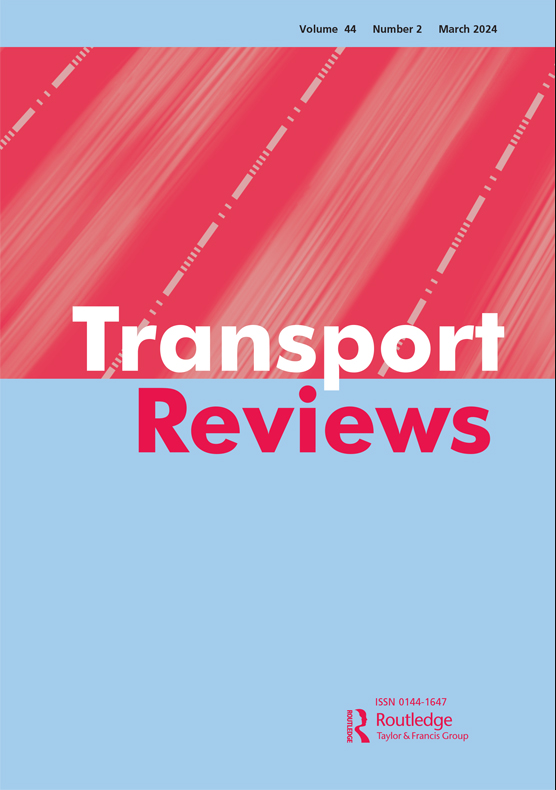Synchromodal transport vs. conventional hinterland transport: a stakeholder theory analysis
IF 9.9
1区 工程技术
Q1 TRANSPORTATION
引用次数: 0
Abstract
Synchromodality aims to reduce costs, emissions and delivery times by offering a flexible and adaptive mode choice and seamless integration of transport modes, both horizontally and vertically. The concept, which has hardly been applied in practice, poses significant requirements for the involved stakeholders and their interactions. However, there has been limited research on how stakeholder dynamics should be shaped and adapted compared to the conventional hinterland transport stakeholder dynamics to facilitate synchromodal transport. Our study fills this gap by presenting an overview of the stakeholders that should be involved in synchromodality, their decision-making responsibilities and relations (referred to as stakeholder dynamics), illustrated in a conceptual synchromodal stakeholder network. Then, this network is compared to the conventional port-hinterland transport stakeholder network, which is the transport chain in which synchromodality is likely to be applied. To this end, this paper analyses and integrates literature on three topics: synchromodality, stakeholder dynamics in the port-hinterland transport chain and stakeholder theory. Our analysis reveals that facilitating synchromodal transport necessitates adaptations such as the inclusion of additional stakeholder roles, the delegation of decision-making power, and the evolution towards collaborative relationships. However, examining these requirements through the lens of stakeholder theory exposes significant complexities, such as an increased risk of opportunism, thereby giving rise to the formulation of an extensive future research agenda. The findings were tested against industry experts’ views in a workshop and focus group. This analysis should enhance the understanding of synchromodal stakeholder dynamics and its challenges from a stakeholder theory perspective, contributing to further developing dynamic stakeholder management strategies.
同步式运输与传统内陆运输:利益相关者理论分析
Synchromodality旨在通过提供灵活和自适应的模式选择,以及水平和垂直运输模式的无缝集成,降低成本、排放和交货时间。这一概念在实践中很少得到应用,它对相关利益相关者及其相互作用提出了重大要求。然而,与传统的腹地运输利益相关者动态相比,如何塑造和适应利益相关者动态以促进同步运输的研究有限。我们的研究通过概述应该参与同步的利益相关者,他们的决策责任和关系(称为利益相关者动态)来填补这一空白,在概念同步的利益相关者网络中进行了说明。然后,将该网络与传统的港口-腹地运输利益相关者网络进行比较,后者是可能应用同步性的运输链。为此,本文对三个主题的文献进行了分析和整合:共时性、港-腹地运输链中的利益相关者动态和利益相关者理论。我们的分析表明,促进同步式运输需要适应,如包括额外的利益相关者角色,决策权的授权,以及向合作关系的演变。然而,通过利益相关者理论的镜头检查这些要求暴露了显着的复杂性,例如机会主义风险的增加,从而引发了广泛的未来研究议程的制定。研究结果在研讨会和焦点小组中与行业专家的观点进行了对比。这一分析将从利益相关者理论的角度加强对同步利益相关者动态及其挑战的理解,有助于进一步制定动态利益相关者管理策略。
本文章由计算机程序翻译,如有差异,请以英文原文为准。
求助全文
约1分钟内获得全文
求助全文
来源期刊

Transport Reviews
TRANSPORTATION-
CiteScore
17.70
自引率
1.00%
发文量
32
期刊介绍:
Transport Reviews is an international journal that comprehensively covers all aspects of transportation. It offers authoritative and current research-based reviews on transportation-related topics, catering to a knowledgeable audience while also being accessible to a wide readership.
Encouraging submissions from diverse disciplinary perspectives such as economics and engineering, as well as various subject areas like social issues and the environment, Transport Reviews welcomes contributions employing different methodological approaches, including modeling, qualitative methods, or mixed-methods. The reviews typically introduce new methodologies, analyses, innovative viewpoints, and original data, although they are not limited to research-based content.
 求助内容:
求助内容: 应助结果提醒方式:
应助结果提醒方式:


